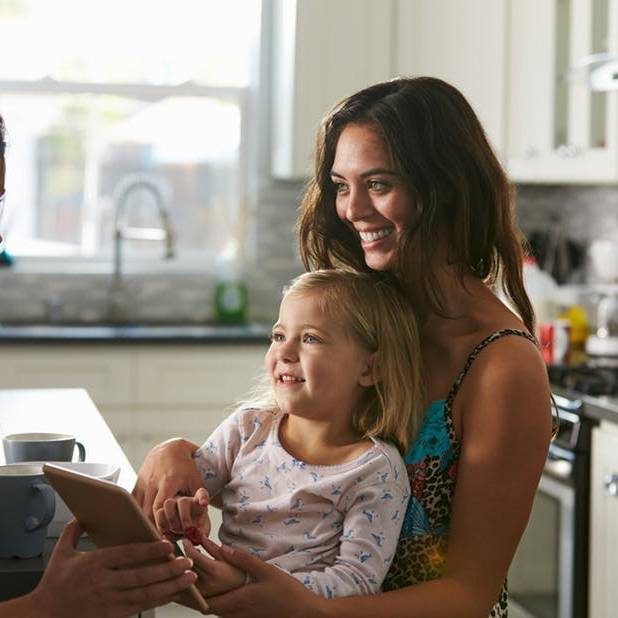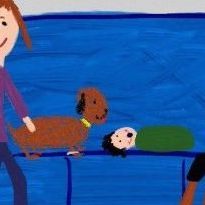How to teach your children to be “street wise”
With child abductions getting so much attention in the media at the moment, parents can get really frightened for their children. We cant put our
children in a cocoon 24/7 but we can give them some skills which can make a
big difference between staying safe and attracting the wrong kinds of attention. here are my top ten simple tips.
1. Give your child permission to say "NO" to adults
This is the number one rule. If you do not allow your child to say "No" then
how can they realise they have ownership of their minds and bodies? Children
should not be forced into shows of affection, they have rights like we do.
If your child does not want to kiss Aunty Jane or hug Granddad or cuddle
their Godmother, it is 100% OK! Why should they have to? Its fake if they
are forced to do it.
If your child learns from you that they should kiss or hug someone they do
not want to, how will they differentiate the proper limits of affection? If
the situation arises where another adult tells your child to kiss or touch
them, how will your child know how to say no, or even that they should?
Ask your child if you can have a hug or a kiss, and if they say no, be
respectful. Let your child make the choice. They better they get at making
decisions, the better they will be at making decisions when parents and
carers are not around to protect them, becoming responsible for themselves
2. NO SHORTCUTS
if your child walks or rides to and from school alone, they should always
take the safest route. Shortcuts through lane ways, alleyways or shopping
centres can be the perfect opportunity for them to be grabbed or assaulted
without witnesses. Children should be taught to focus on denying abductors
privacy, drawing public attention to the situation, and getting help from
other adults.
Encourage your child to take the same route home every day, this will help
parents and friends find them if they are late. Also develop safe zones with
neighbours. Elderly people sitting on their porch, stay at home Mums & Dads,
are all reliable witnesses and extra sets of eyes. A community needs to help
protect its children
3. IMPORTANT INFORMATION
Your child should know their name, address, phone number and preferably
parents work numbers as well. This is extremely important so that your child
or other adults can immediately get in contact with you. Teach drills for
dialling "000" so that your child knows what to do in the case of emergency
at home.
4. WHEN LOST
We have all seen lost children crying at the supermarket or shopping centre.
Its a terrifying experience for both parent and child. Have a prearranged
course of action so that should you and your child become separated, you
both know what to do.
Teach your child how to seek out help from the concierge or the front of the
counter at the main store. I teach my students to look up to find the
security camera, and go and stand right in front of it. You'll notice that
they will almost always have a security camera there. Remain calm, teach
your child to know what do to. Go to the shopping centre and practice ! If
you DO lose your child, do NOT leave the shopping centre! Contact the lost
and found dept!!!!
5. TRUST YOUR INSTINCTS
Children have a very animalistic sense of good and bad. As adults, we have
been trained to ignore this sense through demands for good manners and
social acceptance. If your child says someone gives them a bad feeling,
trust them. There is a difference between when a child has been naughty at
school for example and says they don't like the teacher anymore, and when a
child says "so and so is creepy" or "so and so makes me feel uncomfortable"
believe your child. If they don't want to be alone with that person, don't
let them be alone with them. Perhaps its just childhood fear, perhaps it is
something more sinister. Trust your child and let them trust their
instincts..teach them its ok to tell you if someone makes them feel weird.
Don't shut them down, or try to reason with them. Just let them talk it out.
6. CHECK IT OUT
We are all incredibly busy – but we should never be too busy to check out
the people who have responsibility for their children.
Check that their teacher is qualified, check their scout leader, ballet
teacher, martial arts instructor or babysitter has been police checked, has
their first aid certificate, good references – PHONE their references, don't
just read them! See how you feel about them personally. Do not just trust a
reference – never let someone do your job for you. Do it yourself, and do it
thoroughly.
7. CODE WORD
One of the most important things you can give your child is a code word to
let you know if things are not ok, or to let them know that a person you
have sent to collect them from school has really been sent by you. Most
abuse is carried out by people your child knows. Have a code word that your
child can ask for to check if all is as it should be, or so that they can
ring you and just say the code word as a way of letting you know all is not
well and they cant talk now. Young children should not go anywhere with
anyone who does not know the codeword. No codeword, no going with the adult.
Abductors will make up any excuse to get a child to go with them. "Your mums
in hospital, there has been an accident" – no codeword, no go. Its that
simple. Train your child and train them now!
8. NO PERSONALISED CLOTHING OR LABELS
Our name is a handle our attention is grabbed with. Your child is no
different. Having labels with names and addresses clearly visible to all
makes it very easy for an adult to approach your child knowing their name,
or able to discover where they live and wait nearby. Once a stranger has
your child's attention and is talking to them, your child is as good as
caught. Remember, NO VISIBLE NAMES on anything!
9. GOOD TOUCH & BAD TOUCH
This is a topic that makes a lot of adults uncomfortable. Kids learn to sing
a lot of songs at school about "its my body and nobody else can touch it" –
but people touch us all the time. Patting our heads, shaking our hands,
patting on the back, tackling in rugby, even holding hands in dancing. How
do we differentiate? The best way is to tell your child NOBODY is allowed to
touch them ANYWHERE their swimming costume covers. In fact, nobody is
allowed to take photos of those parts of their bodies either, or ask to look
at them. Start teaching your child that now, and teach your child that if
anyone, anywhere, no matter who, asks to look, photograph or touch, that
they MUST tell YOU EVERY TIME. Help your child to know they can trust you
and that you will always take what they say seriously.
10. TALK TO YOUR KIDS
Too many people leave communicating with their children for when they are
un-commuicative teenagers.
Its too late by then! You need to cultivate an atmosphere of listening,
sharing and talking with your child from the time they are big enough to
talk. None of us were born communication experts, but there are SO many
books out there in the marketplace by world experts in the field. Learn
about making "I" statements, taking turns at listening to each other without
judgement, giving feedback and problem solving. You will reap the rewards
when you have a teenager who has been communicating with you since
childhood



